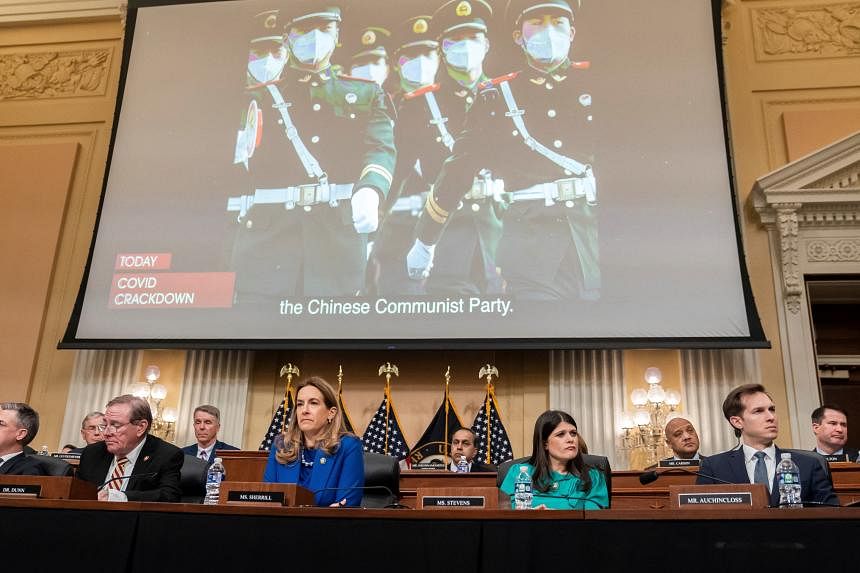WASHINGTON - The United States Congress on Tuesday debated more than a dozen China-related measures and held a prime-time hearing on the dangers that the Communist Party of China (CPC) posed to America’s national security, in a sign of Washington’s bipartisan determination to take bolder steps to counter its greatest geopolitical rival.
Republican Mike Gallagher, who chairs the House panel tasked with investigating challenges from China, warned Congress could not afford to be divided or slow-moving if it wanted to thwart the ideological, technological, economic and military threat posed by the CPC.
“We may call this strategic competition, but it’s not a polite tennis match. This is an existential struggle over what life will look like in the 21st century,” said Mr Gallagher in the panel’s debut hearing, which featured Chinese dissidents and former Trump administration officials as witnesses.
He declared that the past half-century of America’s uncritical economic engagement with China in the hope that it will lead to political reform was over, saying: “It didn’t work out. We were wrong... That era of wishful thinking is over.”
The panel’s top Democrat, Mr Raja Krishnamoorthi, stressed that the US did not want a war with China nor a clash of civilisations, but sought a “durable peace” by deterring Beijing’s aggression worldwide.
He also urged his colleagues to avoid anti-Chinese or anti-Asian stereotyping at all costs, a concern of Democrats who backed the panel despite reservations that it could fuel xenophobia.
Two protesters briefly disrupted the three-hour-long hearing, with one yelling that the committee was focused on “sabre-rattling” and not peace, before being escorted out by security.
The hearing was accompanied by video presentations that featured a record of the CPC’s human rights abuses, and clips of Chinese President Xi Jinping stressing the importance of communism.
It capped a day of multiple hearings in the House and Senate, over a slew of China measures that ranged from a TikTok ban to sanctions to deter it from invading Taiwan, which Beijing regards as a renegade province to be unified with, by force if necessary.
The House Foreign Affairs Committee debated 11 measures, mostly related to China, including ceasing to label it a developing country, and giving President Joe Biden the authority to ban social media app TikTok.
“TikTok is a modern-day Trojan horse for the CPC used to surveil and exploit Americans’ personal information,” said the committee’s chair Michael McCaul, who called the legislation a first step in protecting Americans against subversive data collection.
The committee’s top Democrat Gregory Meeks, however, opposed the Bill to grant President Biden the power to ban TikTok, on the grounds that it could bring more companies into China’s sphere while destroying jobs in the US and undercutting America’s core value of freedom of speech.
He also called the Bill overly broad, with the potential to inadvertently include companies that posed no national security risks. The committee’s vote on whether to green-light the Bill was eventually postponed until Wednesday.
Earlier in the day, the committee also grilled officials on why the Biden administration continues to grant licences that allow critical US technology to be sold to blacklisted Chinese companies.
Mr McCaul, who has called for such export controls to be tightened, noted that the Commerce Department recently approved licences worth US$60 billion (S$81 billion) to tech giant Huawei and US$40 billion to chipmaker SMIC.
The House Financial Services Committee also advanced seven Bills related to China or Taiwan, although they still need to be passed in the Republican-held House and the Democrat-controlled Senate before the President can sign them into law.
The Bills call for sanctioning top Chinese officials and excluding them from international meetings if Beijing attacked Taiwan, as well as mandating that the US champion Taiwan’s membership in the International Monetary Fund, among other measures.
Chinese Foreign Ministry spokesman Mao Ning said at a regular press briefing on Wednesday: “We ask that the relevant US departments and personnel abandon ideological bias and Cold War zero-sum thinking, look at China and US-China relations objectively and rationally, stop spreading the ‘China threat theory’ based on false information, stop denigrating the Communist Party of China, and stop taking US-China relations hostage for political self-interest.”
Hudson Institute Asia-Pacific security chairman Patrick Cronin told The Straits Times the prime-time hearing was emblematic of the Republican House’s more hawkish agenda, although lawmakers from both parties were determined to find common ground.
“Republicans are using their new majority in the House to elevate priorities they think are critical for the nation and for regaining the White House in the 2024 elections. A leading policy theme is the need to get more serious about the China challenge,” he said.
Professor of practice of international affairs Robert Sutter of the George Washington University said the slew of hearings highlighted a powerful, bipartisan momentum in Congress to confront China.
“We’re seeing momentum on the part of the US government to take stronger positions against policies and practices of the Chinese state that have been very antagonistic to the US. The realisation of the need for doing this and the actual actions are increasing. That’s what we’ve seen over the past year, and it’s going to continue,” he said.


